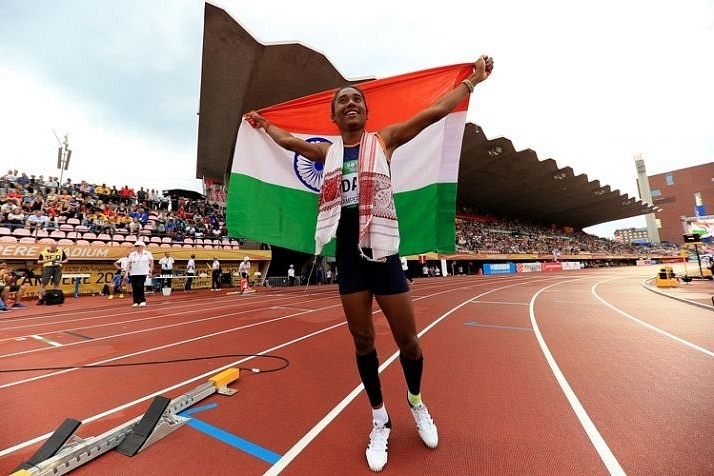Politics
The Outrage Over ‘Hima Das Caste’ Was Overblown; If You Really Want To End Casteism, End Caste Counting
- The only logical way to hasten the demise of caste is to stop counting castes, with focus on affirmative action and quotas on the socio-economic status of individuals and households.

Why is the caste of Hima Das a matter of debate?
There was much manufactured outrage on Twitter the other day over a Google search that threw up “Hima Das caste” as the top option. And this after she did India proud by winning gold at the IAAF World U20 Championships in the women’s 400m finals last week (12 July).
Most of the outrage was probably just virtue-signaling. While there is little doubt that Indians do show an inordinate interest in caste, the rage was overblown for the simple reason that once an early trend in some area gets established on Google, it may be self-perpetuating. If some of the initial searches were about her caste, the same search string would get thrown up repeatedly, and thus prompt people to click and check anyway. It does not in any way suggest that those searching for her caste were particularly casteist. In many situations, people do opt for the first thing thrown up as a choice. For example, if the search string were to throw up “Hima Das Millionaire” as the top option, it is more than likely that people would have clicked on that too, for people are always interested in knowing who is rich and who is not.
It is also interesting to note that if you were to type “Rohith Vemula” on Google, caste will figure nowhere in the top search strings offered as choices, when we know that the entire media outrage in 2016 was over the fact that a Dalit committed suicide in a situation that was embarrassing to the Bharatiya Janata Party. Even though later reports indicated that he probably was not a Dalit, nobody seemed interested in learning about this, since the outrage was over his Dalit identity, not the fact that a young man with dreams died such a tragic death. No one wanted his or her biases proved wrong. So, no caste in the Rohith Vemula search.
In the Hima Das case, it is possible to speculate that many of those early searches which established the hierarchy of interest may have been initiated by people who thought she may have belonged to their caste – and wanted to be sure. After all, one famous TV anchor tweeted about his pride in GSBs – Goud Saraswat Brahmins – when Suresh Prabhu and Manohar Parrikar were inducted into the Narendra Modi cabinet in 2015. Caste pride remains a potent force, even though this is not the same as being casteist. We all take pride in people we consider just like us, and this is not a sign of bigotry.
The truth is, despite the existence of unconscionable caste violence and discrimination in Indian society, caste is actually dying a slow death in urban India. Market forces, which recognise competence rather than caste, close living, and daily mixing with people of all castes (whether in crowded buses or trains) make us inured to caste. At best, caste is a consideration when we think about arranged marriages, where the logical place to start looking for partners is the caste or community you hail from. But even here, it is the network rather than caste alone that matters.
Consider the kind of columns that would get written if Hima Das were a Dalit or if she were from the upper castes. In one case, one can visualise habitual Hindu baiters emphasising the fact that she became a star despite being a Dalit, and despite discrimination in a caste-based society. I don’t actually know which caste she is from, but when I write these lines I find that I need to figure out her caste to make my points. I am resisting the urge to add more reasons for Google to make “Hima Das caste” the perpetual top option in searches.
There is actually a simple way in which to show casteism the door so that it ends more quickly than it is doing now. It is to stop counting caste.
In politics as in public policy, what you count is what counts. This is why caste became a big issue after the British started enumerating them in various censuses. Today, OBC politicians want the government to tell them what the actual numbers of OBCs are so that they can demand more reservations and also woo those castes more assiduously. In a recent Karnataka caste survey (yet to be officially released), SCs/STs and Muslim numbers are said to be larger than Lingayats and Vokkaligas put together, thus giving politicians new ways to divide voters. Larger numbers mean politicians will throw more freebies at those communities, never mind their actual economic status. Communities that are losing numbers will resist the unveiling of the new survey, for it suddenly costs them clout.
To repeat: the only logical way to hasten the demise of caste is to stop counting castes, and focus affirmative action and quotas on the socio-economic status of individuals and households.
But who wants this disruptive force to weaken caste, when politicians and the Lutyens elite want the opposite in order to ride to power on the miseries of the poor?
Introducing ElectionsHQ + 50 Ground Reports Project
The 2024 elections might seem easy to guess, but there are some important questions that shouldn't be missed.
Do freebies still sway voters? Do people prioritise infrastructure when voting? How will Punjab vote?
The answers to these questions provide great insights into where we, as a country, are headed in the years to come.
Swarajya is starting a project with an aim to do 50 solid ground stories and a smart commentary service on WhatsApp, a one-of-a-kind. We'd love your support during this election season.
Click below to contribute.
Latest